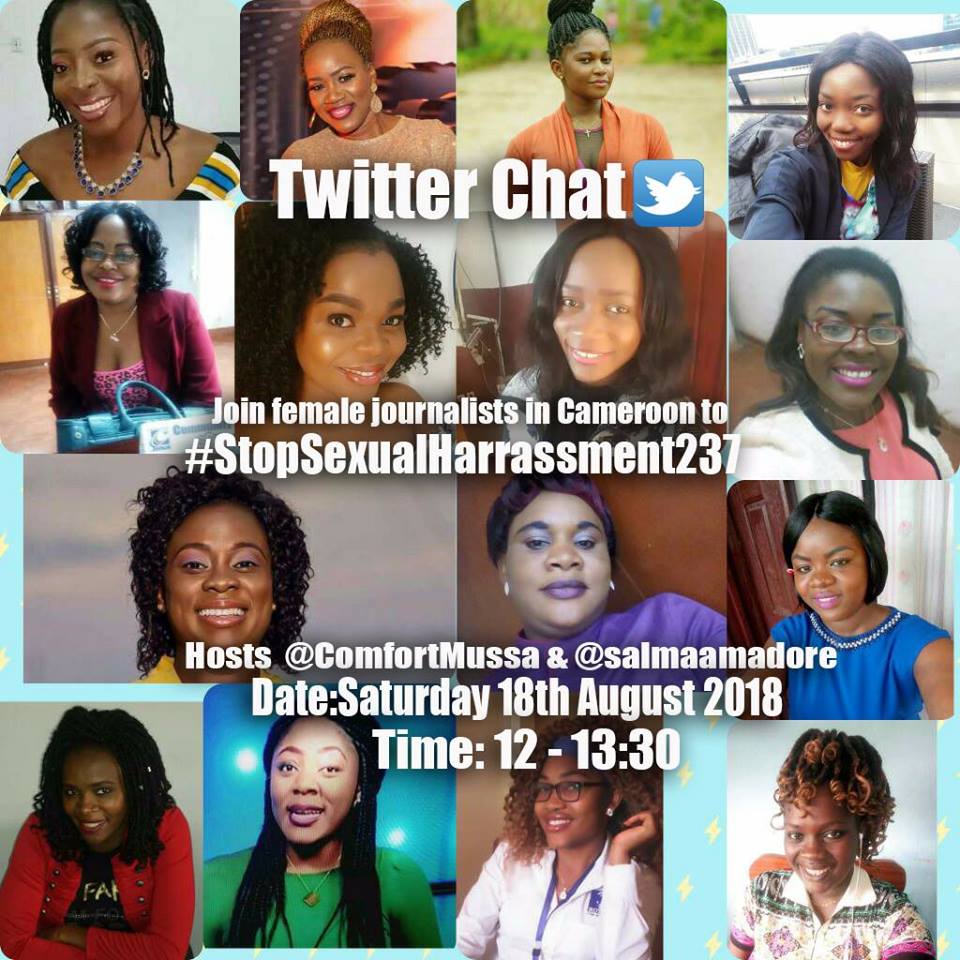Prize-winning reporter Comfort Mussa used her Facebook page to sound the alarm: “Female journalists in Cameroon have to team up to fight sexual harassment in the media. It is widespread & this has to change. Who's in?” she posted on August 8.
The response was swift and forceful.
Within days, a coalition of female journalists, led by Mussa, launched #StopSexualHarassment237. The campaign, named for Cameroon’s country code, targets the media industry in the Central African country of 23.5 million, with the goal of stamping out sexual harassment and intimidation that occurs at an “alarming rate” at these institutions, according to Mussa.
The women knew they faced a steep, uphill climb. A report by the International Women’s Media Foundation showed a clear pattern of male dominance in newsrooms worldwide. They looked beyond Cameroon for motivation.
“The #MeToo campaign in the United States greatly inspired ours,” wrote Mussa in a September email.
The women had tired of recurrent stories and incidences of sexual harassment in media organizations and journalism schools. “Enough is enough,” she said.
Organizers set up a WhatsApp group and created a Cameroon Media Women Facebook page inviting other female journalists from Cameroon to help in planning strategy. In mid-August, the group hosted a 90-minute Twitter chat that they described as the “debut of Cameroon’s #MeToo movement.”
“The response was magnificent,” said Eileen Manka, one of the movement’s organizers. The Twitter chat “made more female journalists — especially the most vulnerable — feel their concerns were being addressed.”
A dozen female journalists also spoke out about sexual harassment in short videos posted on Facebook and other social media platforms.
However, not all feedback was positive. According to Manka, some male bosses trivialized the issue and blamed women for dressing provocatively and having a “flirtatious attitude.”
“Rather than looking at [sexual harassment] as criminal [in Cameroon], it is often considered a privilege for a boss to pay attention to a junior female colleague. Men take it for granted or consider it a right,” said Manka. “Women hardly talk about it out of fear or because of the promise of a promotion.”
Other men joined female journalists on radio shows and pledged to collaborate in making changes in their media organizations.
“[Raising awareness] was great for a start,” said Manka.
During the campaign’s second phase, organizers sent a letter to journalism educators, press associations and media managers to raise awareness and invite collaboration. The authors provided a “gentle reminder” of what qualifies as sexual harassment.
The list included:
- Sending suggestive letters, notes or emails
- Displaying inappropriate sexual images on posters in the workplace
- Making inappropriate sexual gestures
- Making sexual comments about appearance, clothing or body parts
- Inappropriate touching, including pinching, patting, rubbing or purposefully brushing up against another person
- Making offensive comments about someone’s sexual orientation or gender identity
- Coercing subordinates into sex in exchange for favorable reports or promotions
“All these acts of sexual harassment have been identified in our institutions and their pervasiveness is indicative of a laissez-faire management style that does not protect the interests of female journalists,” the letter stated at the end of the list of unwelcome behaviors. “Some females are compelled to bear the abuse as a condition for continued employment.”
It ended with an invitation: “Our momentum is building. We are speaking with one voice. Join us!”
The women are already meeting with newsroom media managers to plan strategies for change and push for punishment of perpetrators. They plan to meet with journalism school administrators and make presentations about sexual harassment to students.
Mussa encourages female media professionals to start the process by asking, “Does this company have a gender policy?” If the answer is no, she advises: “Bring it up during a staff meeting. Talk to your boss. Do something about it . . . Your salary is not the only thing you should cross-check on your work contract. Your safety and sanity are important, too.”
Comfort Mussa said that she had shared IJNet resources on sexual harassment with the #StopSexualHarassment237 team and was seeking additional materials. The following provide insight and practical advice for fighting sexual harassment anywhere in the world:
The World Association of Newspapers and News Publishers’ toolkit for media companies includes practical tips for employers and employees, model policies and communication templates. A poster, designed to be displayed in newsrooms, explains how to identify sexual misconduct, how to report it and the legalities involved.
The Society of Professional Journalists’ four-step model advises media companies to create a sexual harassment policy and require employees to acknowledge in writing that they have read it. The website also offers resources, including a guide from the American Association of University Women, on knowing your rights in the workplace.
An article from The New York Times titled “Sexual Harassment Training Doesn’t Work, But Some Things Do” provides a blueprint for creating a safer workplace culture. The five-step approach includes empowering bystanders and encouraging civility among its tips. The article also includes a warning, “Research suggests if you let the small things slide, it opens the door for more severe behaviors to enter the workplace.”
For more information on the Cameroonian campaign, check out #StopSexualHarassment237 on Twitter or Facebook.
Main image CC-licensed by Flickr via WOCinTech Chat. Second image is a screenshot of #StopSexualHarassment237 promotional materials.


